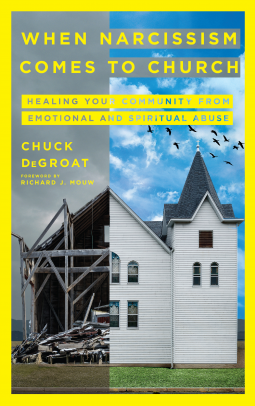
When Narcissism Comes to Church
Healing Your Community From Emotional and Spiritual Abuse
by Chuck DeGroat
This title was previously available on NetGalley and is now archived.
Send NetGalley books directly to your Kindle or Kindle app
1
To read on a Kindle or Kindle app, please add kindle@netgalley.com as an approved email address to receive files in your Amazon account. Click here for step-by-step instructions.
2
Also find your Kindle email address within your Amazon account, and enter it here.
Pub Date Mar 17 2020 | Archive Date May 15 2020
InterVarsity Press | IVP
Talking about this book? Use #WhenNarcissismComestoChurch #NetGalley. More hashtag tips!
Description
Outreach Resource of the Year
Why Does Narcissism Seem to Thrive in Our Churches?
We've seen the news stories. Maybe we ourselves have been hurt by a narcissistic church leader. But what is narcissism, really? And how does it infiltrate the church?
Chuck DeGroat has been counseling pastors with narcissistic personality disorder, as well as those wounded by narcissistic leaders and systems, for over twenty years. He knows firsthand the devastation narcissism leaves in its wake and how insidious and painful it is. In When Narcissism Comes to Church, DeGroat
- takes a close look at narcissism, not only in ministry leaders but also in church systems;
- offers compassion and hope for those affected by its destructive power and;
- imparts wise counsel for churches looking to heal from its systemic effects.
DeGroat also offers hope for narcissists themselves—not by any shortcut, but by the long, slow road of genuine recovery through repentance and trust in the gospel of Jesus.
Advance Praise
"For far too long the evangelical church in America has nurtured and supported narcissism in our leadership. The addiction to platforms, influence, new ideas, as well as unbiblical definitions of leadership, authority, and power has sustained a structure that dehumanizes our leaders and exploits God's people. When Narcissism Comes to Church is an important book in a season when we must ask deeper questions of the very structure, metrics, motivations, and means to the work we set out to do in the name of Christ. Dr. DeGroat does not merely point a finger at narcissistic leaders, but asks us to consider these individuals in our church as fruit of a more fundamental problem in the American church. May we have ears to hear, humility to repent, and courage to respond."
-Dennae Pierre, director, City to City North America, Surge Network leadership team
"Hiring (marrying, working with or for, being pastored by) a narcissist is like building a home in an alluvial plain. The ground is gorgeous but in due season the flood will devour all you have worked so hard to create. Chuck DeGroat pierces the glittering image of narcissism and brilliantly exposes the inner workings of an empty, shame-filled heart and the devastating consequences of Christians being so drawn to narcissists in the church and in politics. This is a landmark work, full of wisdom, tenderness, honor, and hope. If we want to offer a narcissistic culture hope in the gospel, we must tend to the narcissism deeply embedded in our own believing community. This is a profound call for a radical culture shift—truly a must-read."
-Dan B. Allender, professor of counseling psychology and founding president of the Seattle School of Theology and Psychology, author of The Wounded Heart and Healing the Wounded Heart
"In the work of the soul, we name things to tame things. And there is nothing that is more in need of taming than the rampant narcissism that is not just a part of our cultural landscape but is hiding in plain sight in my own life. With When Narcissism Comes to Church, Chuck DeGroat unflinchingly names the subject for the leviathan it is, while offering hope in real, embodied stories of redemption. Comprehensive in scope, accessible in application, and generously kind in spirit, this book will provide pastor and laity alike the wisdom and courage that is necessary for the healing and recommissioning of the church's soul for years to come."
-Curt Thompson, psychiatrist, author of The Soul of Shame and Anatomy of the Soul
"I am grateful that Chuck DeGroat wrote this book. He is the best person I could imagine to write it and the person I would want as a guide on this issue. Chuck has a wealth of wisdom to offer as he has counseled those with narcissistic personality disorder as well as the those deeply wounded by narcissistic leaders. This book is filled with compassion for both narcissists and those affected by the destructive power or narcissism."
-Justin S. Holcomb, Episcopal priest, seminary professor, and coauthor of Rid of My Disgrace: Hope and Healing for Victims of Sexual Assault
"If you wonder why family and friends have left the church or why you often feel more lost than found when you step into the sanctuary, this book is for you. Whether you're the pastor or the parishioner, Chuck DeGroat, asks the stark-raving honest questions about church and church leadership that most of us are afraid to voice, even though they simmer in our hearts and leave us hot with confusion and emptiness. This book will not challenge you to pick up stones and throw them through stained-glass windows, but it will engage you to look within and find your true North Star to follow through the wilderness of church to an authentic spirituality of living, serving, worshipping, inviting, and communing in love tethered to something far greater than our small denominations, building programs, or evangelism crusades—to Someone far greater than ourselves."
-Sharon A. Hersh, therapist and author of The Last Addiction: Why Self-Help is Not
"Why are we just beginning to talk about narcissism in our spiritual leaders? Chuck DeGroat believes it is because we have been rewarding it in our churches. He is powerfully and painfully right! More than just calling out narcissism, DeGroat skillfully unpacks how it shows up in leaders of large and small churches, beloved Christian celebrities, and seemingly godly men and women. When Narcissism Comes to Church peels back the layers, ever so carefully on our 'real selves.' We need this pastoral-surgical work. Trust the sage guidance offered by Chuck DeGroat, taking us through our illusions into the healing our souls and systems desperately need."
-Dan White Jr., author of Love Over Fear, cofounder of the Praxis Gathering
"I don't even want to venture a guess as to why I was asked to endorse this book. Chuck DeGroat's latest feels like 'a double-edged sword. It penetrates even to dividing soul and spirit, joints and marrow; it judges the thoughts and attitudes of the heart.' Chuck handles his pastoral scalpel with surgical precision, cutting, stripping, and trimming where I need it the most."
-Tim Blackmon, chaplain, Wheaton College
"If you, like so many, have been lured in by the shiny veneer of narcissism only to be left shattered, confused, and filled with shame, you will find help in these pages. In When Narcissism Comes to Church, Chuck DeGroat nimbly pulls back the veil—exposing the many faces of narcissism and helping us see what lies underneath. Drawing on decades of experience, DeGroat writes with honesty, wisdom, and compassion, providing help for the wounded and hope for the church."
-Alison Cook, therapist and coauthor of Boundaries for Your Soul
"A book on this topic is desperately needed right now. But more than that, we need a deeply thoughtful treatise on this subject that also points a healthy way forward. This is that book. Every one of us can learn something from Chuck's words, but more importantly we can gain the courage needed to face this destructive force in our churches."
-Nancy Ortberg, CEO of Transforming the Bay with Christ
"When Narcissism Comes to Church proves what many of us have known for years—that Chuck DeGroat is a skilled surgeon of the soul. His newest book—twenty years in the making—is the definitive 'surgical text' for diagnosing and treating the soul of narcissistic leaders. Layer upon layer, he deftly reveals how narcissism develops, why it's so prevalent in church leadership, and how it traumatizes church communities. The greatest gift of this book, however, is that as DeGroat skillfully exposes the primal wound far below the surface of narcissism, he gently helps each one of us see the pain and wounding in our own soul. Not since Henri Nouwen's classic book The Wounded Healer have I encountered such an essential book on leadership."
-Michael John Cusick, founder and CEO of Restoring the Soul, author of Surfing for God
"When Narcissism Comes to Church excellently articulates God's gracious call to come back to the way, the truth, and the life. Through experience and with expertise, Chuck DeGroat guides us through the darkness of our self-obsessed culture. The light of this book helpfully exposes sickness that exists in much of our church leadership. May God use this work to lead us to repentance."
-Tyler Johnson, lead pastor of Redemption Church Arizona
"Reading this book, you begin to realize that DeGroat's work and diagnosis come from years of having his stethoscope on the church's pulse. He proves to be a seasoned churchman—understanding and working within churches, seminaries, denominations, and networks—but also a competent spiritual director in leading us toward healing."
-John Starke, lead pastor of Apostles Church Uptown in New York City, author of The Possibility of Prayer
Available Editions
| EDITION | Other Format |
| ISBN | 9780830841592 |
| PRICE | $24.99 (USD) |
| PAGES | 208 |
Average rating from 19 members
Featured Reviews
Chuck DeGroat’s “When Narcissism Comes to Church Healing Your Community From Emotional and Spiritual Abuse” is an eye-opening and radical piece of literature that paves the way for a greater experience of shalom in the church, and ultimately the world. Chuck's profound insights through the lens theology, psychology, and spiritual formation, exposes unhealthy narcissism in the church and paves a way for healing and transformation. Healthy leaders = healthy churches = God’s kingdom coming in a greater measure. I highly recommend Chuck’s book!
 Conrade Y, Reviewer
Conrade Y, Reviewer
Self-love is not entirely a bad thing. After all, Jesus did tell us to love our neighbour as ourselves. So, what is the problem when it comes to self-love? The one word answer is: Narcissism. Self-love beomes bad when all the focus, or most of the focus is on ourselves. Someone has said that love is not love until it is given away. Narcissism fits that description of the kind of love that is not given away. How do we recognize it when it arrives? This is what this book is about. Chuck DeGroat has pointed out the major prognosis: It must start with the leadership, in particular, the pastor. The Church of today is swimming in the cultural waters of narcissism. Whether it is a #MeToo or #ChurchToo taglines, many are increasingly impatient about matters pertaining to their needs. More astutely, the author takes us to a deeper level of understanding the roots of narcissism. Taking a leaf from Christopher Lasch's definition of narcissism as "the longing to be free from longing," it is a critical look at narcissism as an unhealthy desire to be dehumanized superhumans. In other words, narcissism makes us "less human." Written over a period of twenty over years, DeGroat shares his experiences with people who had gone through brokenness, pain, and healing. We need to be careful not to carelessly apply labels on people. While we are all capable of narcissistic behaviour, it would be inappropriate to call anybody a narcissist. I think that makes sense. Keeping it as an adjective is more redeemable. Some of the observations about narcissism in the church do offer food for thought. These include:
Those hiding behind spiritual masks;
Those who act in such a way as to put others down;
Pastors who hung on to power and control instead of cultivating healthy relationships;
That the ministry is a magnet for people with narcissistic tendencies;
People who are insecure and easily anxious;
Using spiritual gifts as a gateway to narcissistic behaviours;
How church structures ought to be examined with an eye to beware of breeding narcissism;
...
At the end of the day, narcissistic behaviour is a symptom of something deeper: our sin. The drive and desire for "power, position, wealth, prestige, success, and privilege" are driving us deeper into sin. In order to tackle this at the core, the author guides us through a series of diagnostic exercises and identification traits. We learn of the narcissism spectrum. All of these reveal a common trait: Shame. Out of the Ennegram, we get a list of nine types of narcissism, organized around "heart types," "head types," and "gut/body types." Heart types (2,3,4) are primarily shame-based, focusing on esteem and affection. Head types (5,6,7) are primarily anxiety-based, focusing on security and survivor. Gut types (8,9,1) are anger based as they are focused on power and control. DeGroat goes through each type with descriptions and examples. He combines the research on leadership with the use of the enneagram in the model.
The most disconcerting part of the book is probably that of the characteristics of the narcissistic pastor, which the author describes over two chapters. They alone should shake any pastor down to the core. Are they guilty of self-entitlement? Are they centering all decision-making on themselves? Do they feel intimidated easily? Are they always feeling threatened by others? Do they feel indispensable? These are clues to narcissistic behaviours. With the long list, it is difficult for any pastor to escape from that list. One might even suspect that DeGroat is bashing those in the pastoral ministry. Not true. It is a book that forces pastors or pastors-to-be to re-examine their hearts regularly. Whether it is happening in the past or the present, one must be watchful whether it manifests itself secretly, dormant until it erupts in the future. It might not be wrong to re-title this chapter or even the book itself as the "dark side of pastoral ministry." I suppose that is increasingly important for pastors to check their inner selves due to the rising scandals that are in the news about clergy abuse and so on. Redeeming it is better even if it means suffering some short-term bashing. A humble pastor will be open to correction. Keep watch.
Another important thing that the author warns us about is the systemic narcissism happening. The "grandoise" type delights in itself and prides itself in being the "ideal image." The "vulnerable" type is a "collective arrogance" that refuses to be corrected, and needs to feel special and to succeed. It affects how pastors are called. Thankfully, DeGroat gives us some
My Thoughts
Narcissistic tendencies are symptoms of sinful conditions in all people. Whether one admits it or not, even if one claims no narcissism in the past or present, there is no guarantee it will be the same in the future. The phrase "Keep watch" is the key point to remember in places such as Church or any Christian organization. If the devil cannot hit believers from the outside, he can surely do so from the inside by planting a seed of doubt and pride. Truth is, narcissism is infectious on a systemic as well as a personal level. DeGroat does not mince his words as he critiques the conditions of the Church and many pastors he has seen during his interactions. The problem is much deeper than what many people would honestly admit. Which is more insidious? Systemic or personal narcissism? It is hard to say. Regardless of how we would argue, both are serious problems to deal with. Rather than to examine forensically the levels of dangers, or the relative demerits of either, it is far better to learn to recognize any narcissistic tendencies anywhere before allowing it to take root.
The way that DeGroat has described the nine faces of narcissism makes none of us immune from accusations of narcissistic tendencies. That is another way of saying sin masquerades itself insidiously in every one of us. I like the way DeGroat highlights the path toward a healthier and constructive environment that embraces learning. The part about "relentless curiosity" hits home. Churches that are secure and healthy will always be willing to learn from others. This is what discipleship is about, always learning, and always humble enough to seek improvements. He shares a moving experience about honesty among a group of neighbourhood pastors, which one expresses both gratitude and anger about how the other churches were impacting his own church. Being willing to confess one's narcissistic tendencies is the first step of dislodging any narcissistic foothold on our lives.
This book should be required reading for pastors, leaders, and seminarians training to minister in any organization.
Chuck DeGroat is associate professor of pastoral care and counseling at Western Theological Seminary, Holland, Michigan, and former teaching pastor of City Church San Francisco and executive director of City Church's Counseling Center. He is a licensed therapist, author, retreat leader, and spiritual director. Chuck has been married to Sara for 25 years, and has two daughters.
Rating: 4.75 stars of 5.
conrade
This book has been provided courtesy of Inter-Varsity Press and NetGalley without requiring a positive review. All opinions offered above are mine unless otherwise stated or implied.
An exploration of the effects of a person with narcissistic personality disorder (NPD) when they have wielded significant influence in a church environment, and what to do about it.
The author has much experience working with those with NPD. He discusses what happens when narcissism enters a church environment; he explains what narcissism means, how it gets manifest, from where it comes, and whereas all of us have some level of narcissism, to be able to see the difference with someone with NPD and its effects. He explores narcissism in terms of each of the nine types in the Enneagram and how each type can manifest narcissistic tendencie. He describes the kinds of behaviors and the inner life of a pastor with NPD. He goes beyond people and sees how systems and cultures can manifest narcissism, normally in the wake of narcissists in positions of power. He addresses gaslighting and the power it has over those affected by it. He then sets forth how people can heal from experiences with NPD church authorities, and extends hope that some with NPD might be able to come to grips with the fear and insecurity haunting them and find health. The appendix features an Enneagram based way forward, giving strategies for assisting those with NPD in each type.
This is a hot button issue, and the book covers narcissism and its effects well. I think most would like to see or hope for more on the assistance and healing end of things, but that is likely not realistic.
A good resource for those in ministry.
 Educator 123630
Educator 123630
This book shines a spotlight on a problem that's not even on the radar of many churches. DeGroat is brutally honest without demonizing, and he holds out hope for change without Christian quick-fix cliches. This is a book every church leader should read.
 Alison S, Reviewer
Alison S, Reviewer
The moment I saw this book come through on NetGalley for review, I knew I had to read it. "When Narcissism Comes to Church" s the first book I've read by Chuck Degroat, and it won't be the last. This book is written with thoughtfulness, thoroughness, and nonjudgment. He communicates the dangers of narcissism in clergy as well as a narcissistic system in our churches, but in a way that doesn't repel you. And there isn't an ounce of narcissism in what he says! :) Seriously, though, there's no preachiness or judgment here, just a wonderful presentation of a hot-button topic for anyone who is clergy, connected to clergy relationally, orinvolved in a church, but what's also great about it is that it takes the subject of narcissism and clears away misunderstandings and labels and encourages the reader to sit with the topic and explore their own lives. Not that everyone is a narcissist - that's not his point at all. While I am prone to bouts of strong self-criticism, this book didn't make me feel guilty about myself, nor did it make me think that I'm a narcissist. But since narcissism is such an important topic in our age of social media where we're all tempted to make ourselves look better than we are, he gives the reader space to think and explore the topic without passing judgment. If you take out the label of narcissism, there are lessons for everyone to learn about their own humanity and how we see ourselves, and how we deal with our shame.
I wholeheartedly recommend this book. Thank you to the author, publisher, and NetGalley for an advanced readers copy in exchange for an honest review.
What a resource! Twenty years of examples. The names are changed but I found myself trying to guess identities. The stories range from unfortunate to tragic. It raises great questions. Fascinating look at enneagram tendencies toward narcissism about halfway through. The success stories, the few times churches work through narcissism in its various forms, made smile. Hope springs up.
 Billy H, Reviewer
Billy H, Reviewer
Chuck DeGroat. When Narcissism Comes to Church: Healing Your Community from Emotional and Spiritual Abuse. Downers Grove, Illinois: InterVarsity Press, 2020.
In decades of experience as a pastor, professor and therapist, Chuck DeGroat considers his latest book, When Narcissism Comes to Church, a culmination of studies in narcissism he has pursued on his own initiative since seminary. His specialty is the intersection of spiritual formation and the reality of the lives we live, as well as the culture where we exist. Sadly, given that American culture is a breeding ground for narcissism, the American church has become a direct recipient of the spiritual abuse that narcissism inflicts. As DeGroat writes early in the book, “We swim in the cultural waters of narcissism, and churches are not immune.”
The narcissism that DeGroat covers in the book refers to a clinical disorder known as narcissistic personality disorder (NPD), providing a definition from the Diagnostic and Statistical Manual, or DSM, the central text of the American Psychological Association. In short, NPD signifies a deeply inflated self-image, feeding off a hunger for admiration and trust, that reacts to any perceived threat to that self-image with anger or malice.
He emphasizes that narcissism occurs on a spectrum, and differentiates healthy narcissism, as manifested in normal, reasonable confidence, from the “grandiose and vulnerable narcissism” his book addresses.
DeGroat then begins illustrating the many faces of narcissism, describing them through an Enneagram-based lens. He points out nine different types of narcissists, grouping them into narcissists whose behavior arise from the Heart, Head and Gut. For the Heart types, he lists the “savior,” the “winner” and the “individualist.” For the Head, there are the “distancer” and the “hawkeye.” For the Gut, he indicates the “challenger,” the “wallflower” and the “perfectionist.” He describes various characteristics, such as needing to have control over all decisions or to be the smartest person in the room, rewarding those who obey certain directives and punishing those who don’t, and feeling intimidated by a colleague’s talents, no matter how much they complement their own. He also discusses the shame and range in the inner life of a narcissist pastor that serve as a breeding ground for such displays of NPD, and how they hurt others. While these are generalities, his discussion emphasizes that no two narcissists are the same.
Nor are churches as institutions immune from the effects, even if a narcissist leaves or resigns. DeGroat applies and illustrates how both “grandiose” and “vulnerable” narcissism can be a system-wide phenomenon. He compares such afflicted systems with a picture of health, which “value and build up everyone in the system, maximizing the benefits for all without exploitation.” This can be scary for the reader to process, since a pastor’s time leading a church not only has trickle-down effects for the rest of the staff, but also for the congregation as a whole. The connection between narcissist pastors and/or churches and a form of emotional abuse known as “spiritual abuse” is therefore inevitable.
And, not only is spiritual abuse real, but so is the trauma that lingers. DeGroat describes characteristics of spiritual abuse such as a hierarchy that uses silence to quiet someone and reinforce itself, a moralization of a particular code of behavior in preference over relationship, and an unquestioned certitude based on shaming those who deviate or question an institution or its beliefs. He also pulls back the curtain and intimates the story of his counseling sessions with a young church planter-to-be and his wife, as part of the candidate’s church planter assessment. The arsenal of tests administered pointed early to warning signs, and DeGroat’s personal interviews with both the would-be planter and his wife only confirmed the suspicions their test results fueled. The harrowing part of DeGroat’s story is, beyond DeGroat’s professional assessment of the planter as a minister, that we catch a glimpse of the candidate’s treatment of his wife, including his condescension, his arrogance, and virtual lack of humility. As DeGroat writes, “Perhaps the most frightening thing about narcissism’s bite is that it often comes without leaving a physical wound.” Moreover, narcissists are good at hiding their narcissism, and evading not only the understanding of their effects on others, but also on themselves. In a sense, he validates the traumatic emotional experiences that church pastors, staff members, and congregation members carry with them as the result of narcissism experienced in the church.
Then, a glimmer of hope. DeGroat switches to his pastor hat, and does not leave the reader swarmed in the murkiness of what he has described, but shows the reader a way to heal and recuperate. He brings in the Exodus motif, likening churches and people to the pilgrims undergoing enslavement or going through the wilderness. Rather than resign ourselves to the fate of what we’re either dealing with or have endured, he encourages the reader to identify that “Egypt,” then look for a new way towards wholeness, its resulting pain notwithstanding. He also advises against pursuing such a journey alone, for “the work we do in the wilderness phase of our healing journey requires the leadership of a good and wise guide.” DeGroat then provides a vision for how a church institution heals from narcissism. DeGroat outlines this healing in stages: phase one consisted of everyone being honest about how things were; phase two was the re-imagination of their calling, their mission, and their identity as a church; finally, the third phase, up to which the counselor had shepherded the institution but now was stepping aside, involved the institution taking back the reins. Finally, DeGroat reiterates that transformation is possible for both narcissists and those they harm, and speaks against the reduction of anybody to a label. In other words, the book is not a tell-all expose about another reason why the American church is losing members or is harming Christianity, though he exposes much in the way of psychological objectivity and pastoral exhortation. Rather, DeGroat communicates an opportunity for transformation and growth, still viewing any narcissist as made in the image of God.
DeGroat identifies the problem of narcissism in the church, and describes and details its harmful effects, but also shows what a solution looks like, and what it means to heal and move forward from the problem. Many of us have strained under the dictatorship of a narcissist authority figure in our lives, some even in a church setting, and that leaves lasting damage from which we need healing and transformation. However, when identifying any kind of trespass against a neighbor, much less a narcissist pastor or boss or sister/brother, we must also remember, as DeGroat reminds us, that we are referring to God’s handiwork, someone whom only God knows inside and out, and who has traveled her or his own journey through life. We cannot know the full story of that journey, though narcissism never happens overnight. The age-old adage applies: hurt people hurt people.
DeGroat has written a well-crafted, intellectually-stimulating, mind-opening and spiritually-convicting work. Pastors, churches and laymen alike will benefit from the information and tools DeGroat describes, either as they heal from their own trauma, or seek to help others heal.
 Media/Journalist 622943
Media/Journalist 622943
When Narcissism Comes to Church by Chuck DeGroat is a book to read with your phone in hand or with friends nearby. From the opening pages, I found myself stopping mid-paragraph to text long quotes to friends and to beg my family members to get their own copy so that we could discuss. This is a well-written, fascinating look at a problem that is not just afflicting our country: it is a problem in the Church and a personal issue many are facing within their homes. I found it convicting and helpful and utterly filled with hope. This book is a must-read for Christians, especially those within the American Church.
 Reviewer 546210
Reviewer 546210
About the book • 192 pages • Published March 17, 2020 by IVP • Non Fiction • Christian Living • 5 ⭐️ read • Very Informative
When I started this I was worried it was going to have a negative impact on me. But it was not. It was loaded with first account experiences along with educational, diagnostics, and self evaluation. I had no idea of the spectrum of narcissism was so complex.
Accountability is greatly lacking in the American Church today and this helped me to understand a lot of things about this diagnosis. My mother has boarderline disorder and My father is a narcissist. So for me, this book gave me hope and a whole source of reference books.
This wasn’t an easy read but I think a lot of people would enjoy this as a book study. And the good news is that God never gives up on us!
This was a NETGALLEY gift by the publisher and all opinions are my own. I’ve given an honest review.
Readers who liked this book also liked:
Justin R. Garcia
Health, Mind & Body, Nonfiction (Adult), Parenting, Families, Relationships
Nicole McNichols
Health, Mind & Body, Parenting, Families, Relationships, Self-Help


















